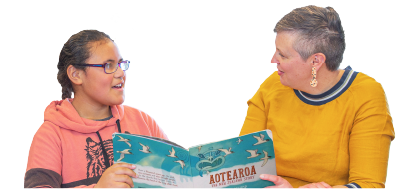Inviting whānau in
Show video transcript
Title slide: Inviting whanau in
Jane Clifford, teacher, Hornby Primary School, Christchurch, facing camera
I think when we're engaging families we have to use every opportunity that we have to bring families and show them that we value their opinions and we value their expertise. We need children all through the day, children will be saying “where’s my Tongan expert, where’s my Fijian expert?” You know, we've, I've gone to the car park to show you know to show parents what we've been doing today and said,” Would you come tonight and help us and see your children perform?” We've used social media, the school Facebook page and children's blogs. We learn create-share skills, so sharing our culture and what we've been doing is an easy thing to do through blogging and it gives children the opportunity to show their wider whānau what they are doing and then to try to bring their families on board as well.
Sarah Yandall-Vaega; Pacific Deans, Whānau Leaders, Kelston Girls College, facing camera
When I first started here there was, you know, parents, some parents now that looked at us and you know and we expect them to come up, ‘Hello’. But, it's you know there you can see there's suspicion you know there's something there like they don’t….So what we do we just call, call, you know and we share with the non-Pasifika - our parents, they prefer you to call, but that call you need to, you know, “Hey how are you? Um look, you know, but you know what, why don’t you come have a cup of coffee with me?” - make it easy. Because if you go straight to the point - “Oh, your daughter's attendance is very poor Da da da da da”. You'll get a no, you'll never get to see the parents’ face.
But we're a very good school and they can come in and discuss what makes us say that because we work in here, we know how to roll and our….. So it's that partnership and connection with them. And then when they come in and they feel welcomed you know it's that cultural aspect like, them, they think you know we are up here and you know that hierarchical, you know, positioning. They then - we don't have to come down to them. That's where they are wrong. And that's the fear because they think that you know, oh no. But when I can speak the language, you know, come in and then they’ll be happy to come in. So we have meetings, and one time where we had to ring over 200 parents for a meeting, come in and most of them turned up and we had to explain to them if you cannot make it, let us know so that we can make an appointment to catch up. So if we say that we had to make sure it happens so always call back; “Remember that?”...“Oh yeah, I’ll come in”
This video is about inviting whānau in and the lengths that schools go to, to bring families into the school environment. Schools need to let families know that they value whānau opinions, expertise and contributions. Partnerships and connections are vital to building a close community network. The fear of the unknown prevents most Pacific parents from engaging with the school. The teacher in the video speaks about hierarchy and parent’s perceptions about teachers. Friendly relationships between parents, whānau and schools benefit the learners. It shows learners that their whānau are involved and that the school making the effort to welcome their whānau into their learning environments.Inviting whānau in
Reflections for individual teachers:
As you watch this video, reflect on your own personal understanding of whānau engagement.
- How do you engage with Pacific parents to involve whānau in their child’s learning? How do you communicate expectations of Pacific parents and let them know how they can contribute?
- How are you working together with parents and whānau towards the specific goal of supporting Pacific learners’ success? Think about the best examples of your collaborations.
Think about effective connections and relationships with parents and whānau, and how you can strengthen those connections through your interactions. Does the focus of these relationships change over time?
Reflections for staff or departments:
As you watch this video, think about ways that your school invites whānau in? How is your school working with parents and whānau to accelerate and support progress and improve achievement for your learners?
Describe the relationship between your school with most Pacific parents and whānau. Is the relationship positively impacting on learners? What is expected of Pacific parents and whānau?
What is your school story about developing effective relationships with families and whānau, and bringing them into the school environment, as part of your connections and engagement with whānau-school partnership?
When your school invites whānau in, do they understand the intent of the relationship?

